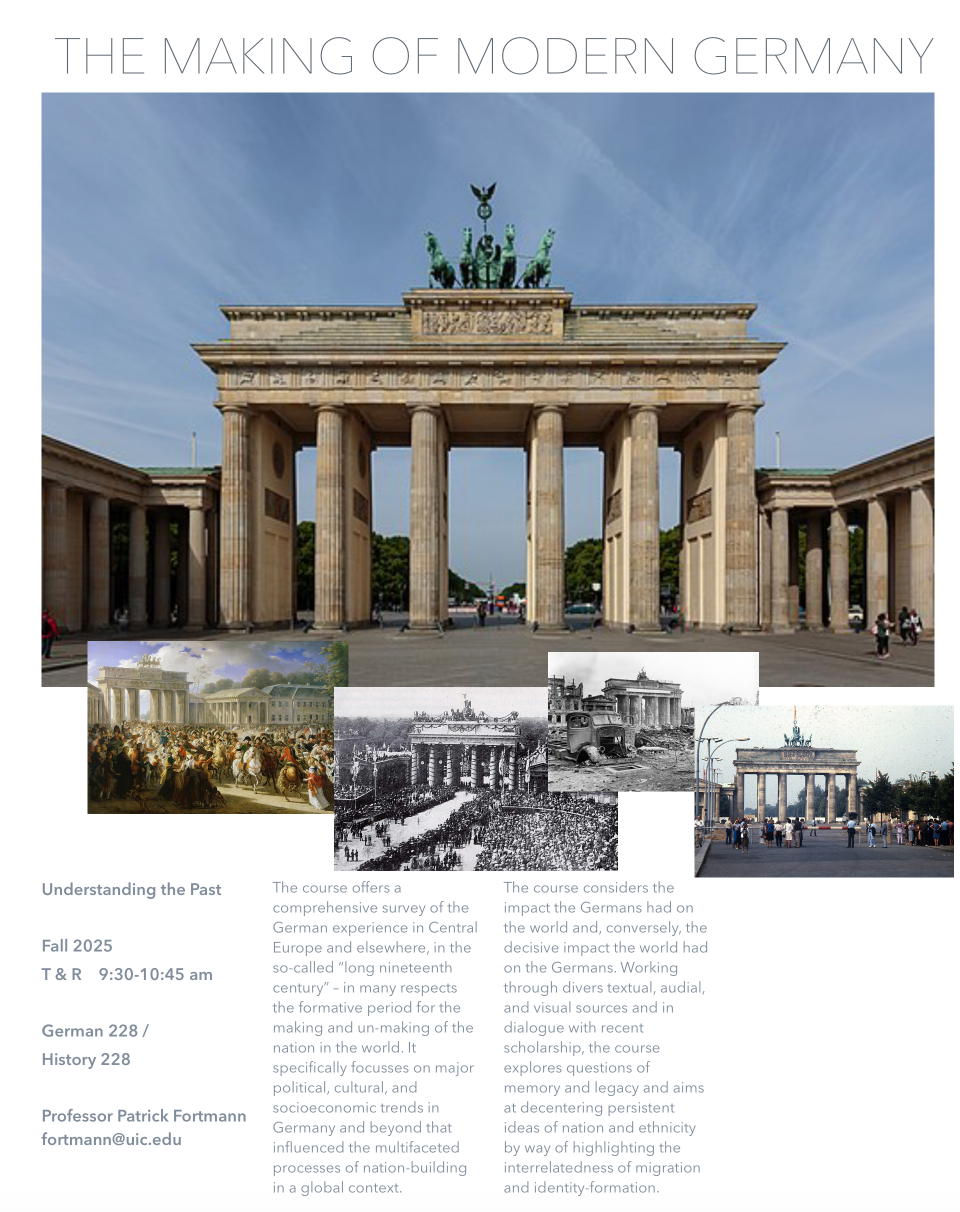Courses
This is an unofficial list of courses that will be offered in Germanic Studies in Fall 2024. It is strictly for the use of expanded course descriptions. For the complete official course offerings, please consult the My.UIC portal.
For a list of all courses and general course descriptions, please see the UIC Academic Catalog.
Germanic Studies Classes Fall 2025

GER 101, 102 (Elementary German I & II); GER 103, 104 (Intermediate German I & II). MWF 4 hours.
All beginning and intermediate German language courses are blended-online and classroom courses. Use of computer and internet access is required.
- 101: 11-11:50 am, 12-12:50 pm, & 1-1:50 pm
- 102: 11-11:50
- 103: 11-11:50 pm
- 104: 1-1:50 am
GER 211: Exploring German Cultures; 3 hours. Instructor: Dr. Heidi Schlipphacke; TR 11-12:15
GER 310: Contemporary German Language, Culture, and Society. 3 hours. Instructor: Dr. Imke Meyer; TR 2-3:15 pm
Fall General Education Courses Taught in English

GER/SPAN/LCSL 207: European Cinema; Instructor: TBA; 3 hours; online asynchronous
GER 217: Introduction to German Cinema; Instructor: Dr. Sara Hall; 3 hours; TR 12:30-1:45 pm
This course introduces students to a diverse selection of films made in Germany between 1895 and 2020 and offers practice in examining them as explorations and expressions of the human imagination and the human experience during the socio-historical events and transitions specific to twentieth-century Germany (East and West). Through reading assignments, in-class discussion, on-line discussion, quizzes, homework assignments and paper writing, students will develop analytical skills in the viewing and interpretation of films and in writing original arguments about film history and cinema culture. Students taking GER 217 will gain the vocabulary for interpreting, analyzing, evaluating and researching films in the context of the history that shaped and was shaped by them. They will advance their ability to read, experience and view films carefully, to think critically, to argue cogently and to communicate ideas about cinema and a non-US culture in written and oral form. This course serves as an elective in the Germanic Studies major and minor, the minor in Moving Image Arts and as a General Education course in the categories of World Cultures and Creative Arts and Ideas. This is a great course for people with an interest in German cultural history or international film history in general. Films will be watched outside of class, supplemented by online discussion and interactive elements on Blackboard. Course Information: Taught in English. No knowledge of German required. Area literature/culture. Creative Arts course, and World Cultures course.
GER 219: Princesses and Storytellers; Instructor: Dr. Patrick Fortmann; Online Asynchronous
GER/HIST 228: Iron and Blood: Germany in the Making (The Making of Modern Germany). 3 hours. Instructor: Dr. Patrick Fortmann; TR 9:30-10:45
For more information about Germanic Studies courses, please contact Ms. Meg LaLonde (mlalonde@uic.edu) or Dr. Patrick Fortmann (pfortmann@uic.edu): http://lcsl.uic.edu/germanic.
Fall 2025 Graduate Courses
GER 514: Germanic Culture from the Industrial Revolution to the Present; Instructor: Dr. Sara F. Hall; T 3:30-6 pm
This course will inquire into German literature’s textual and contextual visual economies. Mobilizing concepts such as apparatus, subjectivity, focalization, perspective, transparency, identification, triangulation, and desire, we will examine how texts relay the sensory experiences of characters while they also activate emotional and sensory responses in readers. Particular attention will be paid to the social, cultural, and technological environments represented in the texts and those shaping the surrounding culture of literary production and reception. Readings will draw on work by authors such as Aichinger, Bachmann, Brecht, Böll, Hoffmann, Hoffmansthal, Kafka, Kaschnitz, Keun, Kracauer, Özdamar, Schnitzler, Seghers, Tieck, and Wolf. Texts are available in German as well as in English; discussions will be in English.
GER 550: The Aesthetics and Politics of Kinship; Instructor: Dr. Imke Meyer; R 5-7:30 pm
This course will explore the diverse kinship structures represented in modern German imaginative works spanning the 18th to the 21st century. Kinship (“Verwandtschaft”), family (“Familie”), and friendship (“Freundschaft”) are nebulous and intermingling concepts in the German Enlightenment and the periods that directly follow it. We will read a variety of literary, theoretical and philosophical works that highlight the allegorical and political functions that inhere in theories of family and kinship. We will likewise explore kinship through the lens of race and posthumanism (human/animal and human/machine relations) and in the context of the categories of class and gender.